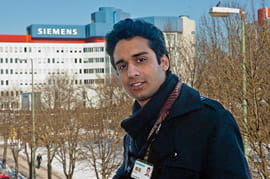Co-op Profile: Aradhya Malhotra

In many ways Aradhya Malhotra is the quintessential Drexel co-op student. He’s entrepreneurial. He’s creative. And perhaps above all, he’s hugely ambitious.
Malhotra, a junior majoring in computer science, has completed three co-ops so far during his time at Drexel, and though two of those co-ops were with the same company—the Germany-based conglomerate Siemens AG—Malhotra says each experience provided its own challenges and lessons.
Taken together, he says, the co-ops have both confirmed his passions for computer science and helped him further refine his ideas for his career to come.
“In my opinion, co-op is an introspective experience,” he says. “It’s about finding out the true sense of a job. As a high school student, you might think you want to be a computer engineer or an accountant, but until you actually do the job, you don’t really know what the job is.”
With three co-ops under his belt, Malhotra certainly knows what life as a tech architect is—and knows, too, the demands that come along with working at the headquarters of one of the largest companies in the world.
In his most recent co-op, Malhotra spent several months working at Siemens’ global headquarters in Munich, Germany. There, he worked with a team of computer engineers on Siemens’ efforts to develop so-called “smart-grid technology”—a means by which power grids can be run smarter and more efficiently. The technology holds the potential to help municipalities and large institutions distribute and use power precisely to the buildings and facilities that needs that power—while cutting back on supply to those that don’t.
“It’s an up-and-coming green technology,” says Malhotra, who continues to work on the project on a part-time basis even now that his co-op in over. “Basically, it’s a computerized way to save energy. For example, if the Drexel Main Building was not using a lot of energy between, say, 2 p.m. and 4 p.m., the system would redirect that power to another building.”
Previously, while working at Siemens’ regional headquarters in Malvern, Pa., Malhotra worked with a team developing new software for the health care industry. The software aims to better integrate patient records and make the experience of visiting the doctor of a hospital less cumbersome.
“If you’re a patient visiting the doctor, with this software, instead of filling out paperwork, it will be pulled up automatically,” he says. “It checks all of your allergies, it keeps track of all the drugs you take, it takes care of checking on all of the interactions, it makes sure you’re being prescribed the right drug. There’s a lot of developing going on in the U.S. for [health care].”
Thanks in large part to his co-op experiences, Malhotra says he feels more than a bit confident about his career prospects. Along with some friends, he recently helped launch a start-up through Drexel’s Baiada Institute, and he hopes to land a job in game development, perhaps at Microsoft.
No matter where he ends up, however, this much is clear: Malhotra is prepared.
And co-op is a big reason why.
“For me, because I was very clear about the path I wanted to pursue, co-op was about gaining as much technical experience as possible,” he says. “My first co-op job was as a web developer, then I was a software developer, and then I became a computer science architect or designer. At the corporate level, that’s pretty much the best experience you can get.”
Drexel News is produced by
University Marketing and Communications.